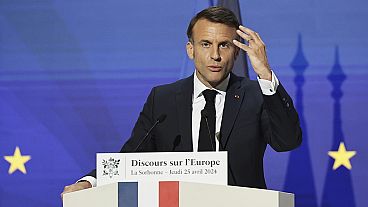Lawmakers are set to greenlight patent rules, but member states have not yet agreed on their position.
New rules beefing the powers of the European Intellectual Property Office (EUIPO) are scheduled to pass through the European Parliament plenary session tomorrow (28 February), but as member states have not yet agreed over the text, a final deal on Standard Essential Patents (SEPs) can only come under the mandate of the new European Commission, potentially in the second half of 2024.
A spokesperson for the Council of the EU, which organises the ministerial meetings, told Euronews that the member states are likely to progress on SEP legislation once another related dossier from the commission’s proposed patent package, on so-called compulsory licensing, has advanced.
A discussion on SEPs - patents vital to high-tech standards such as WiFi and 5G - is scheduled for mid-March among member states. This means that trilogue negotiations, the inter-institutional discussions between commission, parliament and the 27 EU member states, can therefore begin only after the June election.
The parliament's Legal Affairs Committee (JURI) last month already (24 January) adopted the commission proposal on SEPs by 13 votes in favour, with ten abstentions.
In a debate in Strasbourg today, lawmakers were divided about the JURI report, drafted by German Christian-Democrat Marion Walsmann (EPP).
Henna Virkkunen, a Finnish member of the same EPP group, expressed concern about the impact on innovation. “The proposed rules can have a negative impact on 5G where SEPs play a crucial role. The compromise creates too much regulatory burden for SEP holders,” she said.
Walsmann defended her report by saying that the new rules will ensure that third-countries cannot benefit from the current fragmented EU rules. “Our proposal will enable us to reduce the costs of licences and accelerate negotiations,” she said.
Patent package
The commission proposed the patent package in April 2023 with the aim to harmonise fragmented approaches to enforcement of SEP licensing across the EU and making it easier for companies to develop new devices using technologies covered by such patents. SEPs play a key role in the development of connected vehicles, smart cities and technologies to mitigate climate change.
Under the new plans, EUIPO will house a competence centre to administer databases, a SEP register and monitor arbitration of disputes related to SEPs licensing. This centre will carry out non-binding SEPs essentiality checks.
Euronews reported on Friday (23 February) that the EUIPO is subject to complaints filed at European anti-fraud office OLAF alleging fraud at recruitment procedures. A statement from the spokesperson for EUIPO said the agency was unaware of any OLAF complaints, insisting that selection procedures at the agency are open, fair and transparent.
EUIPO, set up some thirty years ago in Alicante, Spain, is responsible for registration of EU trademarks and community designs, two intellectual property rights recognised in the bloc. Each year it registers some 135,000 EU trademarks and about 100,000 designs.
Walsmann told Euronews she was also unaware of the complaints. “I think it would be important for the anti-fraud office OLAF to investigate the complaints mentioned in the article," she said, adding: "We as legislators will be informed of the outcome of the investigation."



